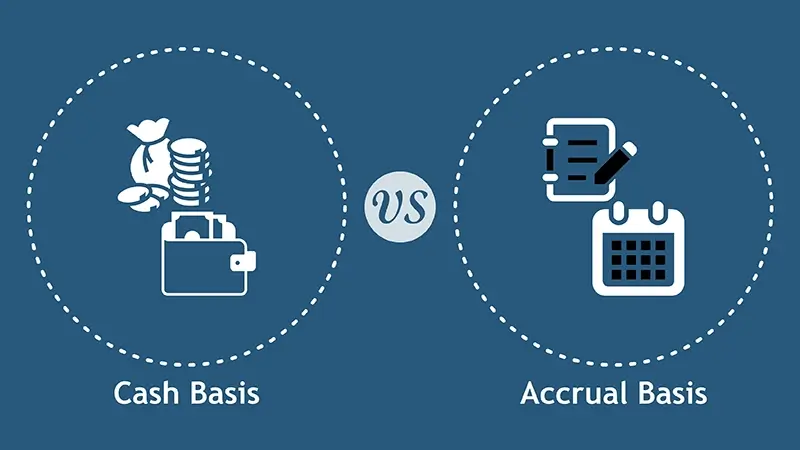Choosing Cash Basis or Accrual Accounting for Your Business
To help you choose between these concepts for your business, first understand their definitions and then consult your trusted CPA.
5 min read
 H&CO
Jan 16, 2024 7:30:00 AM
H&CO
Jan 16, 2024 7:30:00 AM

A strong understanding of Generally Accepted Accounting Principles (GAAP) is essential for businesses operating in the United States. GAAP provides a comprehensive framework that governs the rules, standards, and legal requirements of financial accounting and reporting. These GAAP guidelines and GAAP principles are foundational to the preparation of financial statements, ensuring that financial transactions are recorded, reported, and analyzed accurately and consistently. GAAP requires public companies to report their financial activities in a consistent way, so stakeholders can get a clearer view of a business's financial health. How financial statements are prepared under GAAP guidelines helps stakeholders assess a company's performance by providing transparency, comparability, and accountability.
You might be interested in How to plan for a 529 plan for the future
Generally Accepted Accounting Principles (GAAP) are a standardized set of accounting rules and guidelines used in the United States. GAAP covers the detailed and complex aspects of corporate and business accounting, including how transactions are recognized, measured, presented, and disclosed. Understanding the key concepts and terminology of GAAP is essential for effectively learning and applying these accounting principles.
The Financial Accounting Standards Board (FASB) establishes and maintains GAAP. Private organizations, such as FASB, are responsible for developing accounting procedures and standards, while government institutions enforce compliance but do not create the principles themselves. GAAP combines authoritative standards set by policy boards and widely accepted methods for recording and repo rting accounting information. FASB relies on GAAP as the foundation for its authoritative accounting standards, interpretations, and guidance, which are designed to promote consistency and reliability in financial reporting.
Compliance with GAAP promotes transparency, comparability, and consistency in financial reporting. By using standardized assumptions, definitions, terminology, and accounting methods, GAAP allows investors, lenders, regulators, and other stakeholders to compare financial statements across companies with confidence. Many companies adopt GAAP to ensure their financial statements accurately reflect the company's performance.
GAAP-compliant financial statements help users make informed decisions and reduce the risk of misleading or inconsistent reporting. Without GAAP, investors might be more reluctant to trust the information presented to them by public companies.
GAAP is mandatory for U.S. public companies and organizations regulated by the SEC. Government entities and nonprofit organizations also use GAAP to ensure standardized and transparent financial reporting. The federal government played a critical role in establishing GAAP requirements for publicly traded companies and governmental entities through legislation such as the Securities Act of 1933 and the Securities Exchange Act of 1934. Private companies are not legally required to follow GAAP, but many choose to do so to meet lender requirements, attract investors, support mergers or acquisitions, and improve financial transparency.
All 50 states follow GAAP, and many local entities, such as counties, cities, towns, and school districts, must adhere to these principles. Non-publicly traded companies are not required to follow GAAP, but many choose to do so for credibility with lenders and creditors.
GAAP accounting and tax accounting serve different purposes and follow different sets of rules. GAAP accounting is designed to present a company’s financial performance and position accurately and consistently for investors, lenders, and other stakeholders. In contrast, tax accounting follows Internal Revenue Service (IRS) regulations and is focused on calculating taxable income and determining the amount of tax owed. As a result, income and expenses may be recognized differently under GAAP than for tax purposes, leading to temporary or permanent differences between financial statements and tax returns.
The matching principle under GAAP ensures that expenses are recorded in the same period as the revenues they help generate, providing a more accurate reflection of a company’s profitability and performance. Additionally, revenue recognition is a core GAAP principle that ensures companies record revenue accurately and consistently according to established accounting standards. Understanding these differences is essential to ensure accurate reporting, proper tax planning, and compliance with both financial reporting and tax requirements. GAAP includes principles that govern cost, disclosure, matching, revenue recognition, professional judgment, and conservatism.
Although GAAP is mandatory for U.S. public companies, many private and foreign-owned businesses operating in the United States choose to follow GAAP voluntarily. These companies adopt GAAP to enhance transparency, comparability, and credibility in their financial reporting, which is often necessary for securing loans, attracting investors, or meeting internal management requirements.
GAAP-compliant financial statements are often required by banks, investors, and potential buyers, and they can play a critical role in securing financing, supporting mergers and acquisitions, and demonstrating financial transparency.
For foreign-owned U.S. entities, using GAAP helps align U.S. operations with local regulatory expectations and facilitates clearer communication with U.S. stakeholders, auditors, and tax authorities. Adopting GAAP can also strengthen internal controls, improve financial decision-making, and reduce the risk of disputes during audits or due diligence reviews.
It is important for companies to stay informed about updates GAAP, as the Financial Accounting Standards Board (FASB) regularly revises and updates the standards to reflect changes in the business environment and regulatory requirements.
GAAP compliance is verified through an appropriate auditor's opinion resulting from an external audit by a CPA firm.
GAAP principles are foundational guidelines that ensure consistency, transparency, and accountability in financial disclosures. Understanding key concepts is essential for applying GAAP principles effectively. GAAP is built upon ten fundamental principles that guide ethical and accurate financial reporting:
GAAP includes many complex principles that require deep, technical accounting knowledge.
While GAAP is the standard accounting framework used in the United States, many countries follow International Financial Reporting Standards (IFRS). IFRS standards are principles-based, offering more flexibility in interpretation and application, while GAAP is rules-based and more rigid. This principles-based approach of IFRS allows for broader judgment in financial reporting compared to the detailed, prescriptive rules of GAAP.
IFRS is developed and maintained by the International Accounting Standards Board (IASB), an independent organization based in London with members from around the world. One key difference between GAAP and IFRS is the treatment of inventory: IFRS prohibits the use of last-in, first-out (LIFO) inventory accounting methods, while GAAP permits it.
Currently, more than 140 countries—including those in the European Union, Canada, and Japan—require or permit IFRS for publicly listed companies. IFRS helps improve global comparability of financial statements and can reduce reporting and auditing costs for multinational businesses.
Since 2002, the FASB and IASB have collaborated to minimize inconsistencies between GAAP and IFRS, but as of 2022, the convergence project is coming to an end with no new projects being added. The SEC allows non-U.S. companies registered in the U.S. to use IFRS without reconciling to GAAP.
Both GAAP and IFRS cover business combinations, consolidation, and fair value measurement. There are also differences in the accounting and valuation of intangible assets under GAAP and IFRS. Both standards will remain in use for the foreseeable future, and the presentation of the balance sheet may differ between GAAP and IFRS, affecting how liabilities and assets are classified and reported.
Although the U.S. Securities and Exchange Commission (SEC) has previously expressed interest in allowing or adopting IFRS, U.S. public companies are still required to use GAAP, and no formal transition has been implemented.
At H&CO, our experienced accounting and tax professionals understand the complexities of GAAP, IFRS, and U.S. income tax compliance. We work closely with individuals and businesses to ensure accurate financial reporting, strategic tax planning, and compliance with both domestic and international regulations.
With offices in Miami, Coral Gables, Aventura, Tampa, and Fort Lauderdale, and a global presence, our CPAs and advisors are well-equipped to support your needs, including:
Contact us today to learn how H&CO can support your accounting, tax, and global business objectives with clarity and confidence.

To help you choose between these concepts for your business, first understand their definitions and then consult your trusted CPA.
.png)
High-net-worth individual Accounting Services refer to the specialized accounting services offered to high-net-worth individuals. These individuals...

H&CO has been named on the Forbes list of America’s Best Tax and Accounting Firms 2023. This prestigious award is presented by Forbes and Statista...